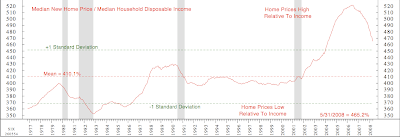Housing, we are not there yet

Amid horrible foreclosure data in the press this morning (and warning that the states legislation is fudging numbers by delaying foreclosure procedures), easy macro-analysis sheds some light on what is to come. Consider the "reverting to mean" that is going on above. Consider that the bell curve started in 2001, so is a very recent event, a bubble really, nothing but a bubble.
If the bubble stabilizes at +1 standard deviation, this is good news. We got 5% downside on the housing market on top of 15% so far so about $160B further damage on the banking system. Well below the FED shock absorbers. All good, we are close to bottom.
If the bubble reverts to mean, we got another 15% to go, to get back to 2001 levels. That is $1T of banking damage. At the FED shock absorbers. Bad but we might make it.
If the bubble overshoots on the way down, at -1 SD, then all bets are off. We are talking about $2T and there is nothing the FED can do. It is game over. In my opinion this scenario is a function of credit, if credit evaporates (M4) then we may be looking at an overshoot.
When a bubble can kill the system, the system deserves to die? In any case, we are not there yet, I am ignoring calls of housing bottom, it is the least plausible scenario.


Comments
In Austin, TX we had a mini-version of this bubble-bust in the 1980s. Prices fell to 80x monthly rental income (except for some exceptional property in exceptional locations). The economic conditions then were much better than now... declining interest rates, much less debt, 3% unemployment in Austin, etc...
I fully expect to be able to buy houses with 20% down (which will be the minimum except for govt loans for primary residence) in most US suburbs at this number (80x monthly income value) by 2010-11. BTW, rents will fall due to the over supply of housing (particularly oversized McMansions which probably will need to become multi-family to afford the energy bill).
80x monthly income value means that a house that will rent for $3000 will cost $240K. This will be a really good deal IF rents and the area have stablized. Normal prices are about 120x which will be where the recovery heads to.
Oh, by the way, 8% to 10% 30 year interest rates are coming back too...
The wildcard next decade for the housing "recovery" will be fuel prices and availability for civilian use. I expect this to steepen the curve, with town and city quality property recovering or stablizing quicker and exurbs becoming worth a lot less (unless said exurb is wealthy or supports some type of mining, major agricultural processing or other rural economic activity).
There was little inflation in the 2001-2006 timeframe... so these are pretty much in real terms... Also since the bench is income and income follows inflation (except now) then you factor it in.. Argument rejected.
Pierre,
a further 20% down would wreak serious havoc on the banking system. With M4 down it will be tough to recapitalize. Not sure the FED can do anything but I would expect serious backstopping action leading to the election or right after.
ut聊天室辣妹視訊
UT影音視訊聊天室
吉澤明步
QQ美女視訊秀
85cc免費影片
aa影片下載城
sex免費成人影片
aaa片免費看短片
美女視訊
sex383線上娛樂場
av969 免費短片
日本免費視訊
aa影片下載城
視訊網愛聊天室
影音視訊交友
咆哮小老鼠分享論壇
sex520免費影片
aa免費影片下載城
aio辣妺視訊
aio辣妹交友愛情館
jp成人影片
aio交友愛情館
馬子免費影片免費線上a片
18成人85cc影城0204movie
免費色咪咪視訊網pc交友
s383視訊玩美女人
34c高雄視訊聊天
jp成人
免費視訊辣妹
kk777視訊俱樂部
xxxpanda
live173影音視訊聊天室
sex520-卡通影片
成人免費視訊 完美女人
13060 免費視訊聊天
sexy girl video movie
辣妹妹影音視訊聊天室
UT視訊美女交友
視訊情色網
百事無碼a片
dvd線上aa片免費看
18禁成人網
ut聊天室kk俱樂部視訊
激情網愛聊天
情人小魔女自拍
卡通aa片免費看
夜未眠成人影城
aio性愛dvd辣妹影片直播
拓網視訊交友
視訊聊天室ggoo
168論壇視訊辣妹
love104影音live秀
美女show-live視訊情色
yam交友辣妹妹影音視訊聊天室
s383情色大網咖視訊
aaa俱樂部
台灣情色網無碼avdvd
sexy diamond sex888入口
Show-live視訊聊天室
aaaaa片俱樂部影片
aaaaa片俱樂部
dodo豆豆聊天室
sex520
網路自拍美女聊天室天堂
免費線上avdvd
援交av080影片
aa影片下載城
aaa片免費看短片
成人圖片區18成人avooo
go2av免費影片
sexdiy影城
免費線上成人影片bonbonsex
0951影片下載日本av女優
sex888免費看影片
免費視訊78論壇
辣妹有約辣妹no31314視訊
dudu sex免費影片
avdvd情色影片
免費色咪咪影片網
av080免費試看
日本美女寫真集
辣妹脫衣麻將視訊聊天室
性福免費影片分享
日本美女寫真集,kk視訊
aio交友愛情館免費成人
美女視訊
bt論壇色情自拍
免費a片卡通
tw 18 net
卡通18美少女圖
色情漫畫777美女
小護士免費 aa 片試看
百分百成人情色圖片
a片免費觀賞sexy girls get fucked
sexy girl video movie
情色文學成人小說
sex888免費看
eyny 伊莉論壇
sexdiy影城
自拍情色0204movie免費影片
aio免費aa片試看
s383情色大網咖
sexy girl video movie
草莓牛奶AV論壇
台灣論壇18禁遊戲區
環球辣妹聊天室 90691
拓網aio交友愛情館
拓網學生族視訊777美女
sex888影片分享區
hi5 tv免費影片
aa的滿18歲卡通影片
sex383線上娛樂場
sexdiy影城
免費a片線上觀看
真人美女辣妹鋼管脫衣秀
比基尼辣妹
一夜情視訊
aio交友愛情館